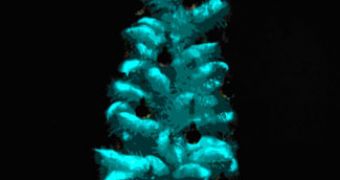Ever since the first Christmas lights came about, people have taken such a liking to them that now there are few who can imagine enjoying their winter holidays without their living room housing a brightly lit tree.
Although one such set of Christmas lights does not burn much electricity, a whole lot of them stand to put significant strain on the grid, and since energy efficiency is part and parcel of sustainability, perhaps opting for a Frankentree instead might be regarded as a rather inspired decision environmentally-wise.
A Frankentree is basically a run-of-the-mill tree whose biological makeup was altered with the help of genes collected from jellyfish and/or fireflies.
The result: a tree that glows on its own and which brightens up indoors without the help of electricity. Tree Hugger reports that a team of British genetic engineers has been working on developing bioluminescent plants for quite some time now, and that thus far they have succeeded in coming up with a self-glowing Douglas spruce.
It is their belief that, sooner or later, bioluminescent Christmas trees will be made available to winter holidays enthusiasts worldwide.
Granted, putting such trees up for sale will also require a well-planned marketing campaign, as most people might prove rather skeptical about buying such a tree, but that is what market researchers are for.
The specialists who investigated this issue explain that, for the time being, the most powerful argument against marketing such Frankentrees is that of money.
Researcher Kay Presland, who pioneered the idea of growing bioluminescent spruces back in 1999, made a case of how, “It's quite feasible. The only problem in reality is the cost.”
“We calculate that the initial trees would cost about £200 ($320), which means going for the upper end of the market. But I'm sure a lot of people would love them, especially the Americans,” this University of Hertfordshire postgraduate went on to add.

 14 DAY TRIAL //
14 DAY TRIAL //